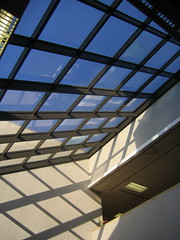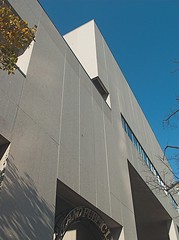Nothing kills a downtown like cheap and abundant parking. This, essentially, is the conclusion of Philadelphia Federal Reserve Bank economist Richard Voith in this 1998 research paper.
Downtowns, or Central Business Districts (CBDs), are increasingly competing with suburban office complexes and subdivisions. Theoretically, each has its own niche: the burbs offer cheap and abundant parking, but you'll die at an early age from the sedentary lifestyle and all the crap you'll eat from lousy franchise restaurants. CBDs, on the other hand, offer cultural events, good restaurants, and pleasant, walkable neighborhoods, but parking is difficult and expensive.
The suburbs seldom try to compete with the CBD by tearing out a parking lot and building a performance arts venue or a celebrity chef's restaurant. But for some reason, CBDs frequently try to compete with the 'burbs by subsidizing cheap parking at the expense of their vibrant communities and neighborhoods.
Voith offers cities two choices, depending on the competitive position of a downtown area: if your office workers and households couldn't care less about your central city and its amenities, then by all means, tear it all down and build cheap parking. Voith admits that "this approach is unlikely to dramatically improve a downtown’s competitive position because the suburbs have a comparative advantage in land uses that demand a lot of space, such as parking lots and roads." Detroit is probably the largest city to have followed this self-destructive model.
"Alternatively, if enough people and firms still find that the dense development found in CBDs is as valuable as ever, adopting policies to increase parking is likely to be counterproductive. Rather, policies should seek to provide high-quality alternatives to driving and parking while accommodating those potential visitors and commuters who must drive, but at prices reflective of both the high value of CBD land and the costs of increased congestion associated with cars in the CBD. Basically, this means improving transit access to the CBD by broadening markets served and improving the price and quality of transit...
Regardless of which view of the value of CBD agglomerations one subscribes to, increasing the parking supply is not a panacea for CBDs. In fact, parking prices in highly successful CBDs are bound to be high relative to those of other competing economic centers. Low parking prices in the CBD are more likely to reflect the failure of the CBD to maintain its unique position as a regional center than to reflect successful parking policies." (Voith, 1998)
In other words, cheap, subsidized parking is a dangerous drug of last resort for failing downtowns.
On a related note, the Wall Street Journal reports that mass transit stations have a strong positive influence on neighborhood property values, and "transit-oriented development" is gaining favor among developers and real estate investors. Read it soon before it goes into the pay archives.







 Learn more, and find out where you can purchase a copy.
Learn more, and find out where you can purchase a copy.